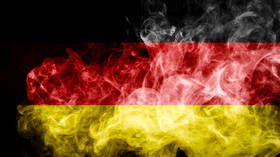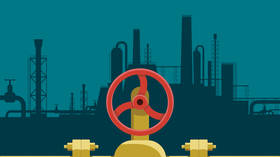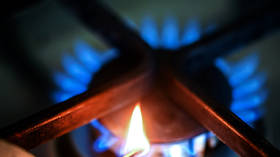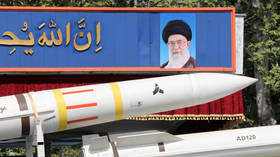Costs to Germany of Russian gas freeze estimated
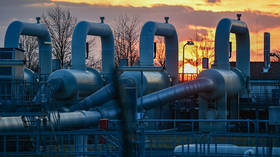
Germany could lose hundreds of billions of euros in gross domestic product (GDP) and face the highest inflation rates in its modern history over the next two years should it stop Russia’s energy supplies immediately. The warning comes from five of the nation’s top economic research centers in a joint forecast published on Wednesday.
Europe’s top economy is still recovering from the economic impact of the Covid-19 pandemic. Meanwhile, Russia’s military action in Ukraine – as well as Berlin’s reaction to it - might further greatly slow down its ability to bounce back, the report warns.
German GDP is expected to increase by 2.7% in 2022, down from 4.8% that was forecast in 2021. And that’s only if “no further economic escalations” take place, the report adds. In case of “an immediate halt to Russian gas supplies” the projected GDP growth would further fall to just plus 1.9% in 2022 before decreasing by 2.2% in 2023, which would mean a recession, the five institutions warn.
“In the event of end to deliveries [of Russian energy], the cumulative GDP loss would be around 220 billion euros in 2022 and 2023 alone, which equals to more than 6.5 percent of annual economic output,” says a press release issued by one of the five institutions – the Institute for Economic Research (IFO), Munich.
If Germany manages to avoid cutting energy ties with Russia, it might avoid a recession as well, the economic research centers believe, adding that, in this case, its GDP would rise by 3.1% in 2023.
A halt to Russian energy supplies would also likely lead to the highest inflation since the founding of modern Germany. The nation is about to face an inflation rate of 6.1% - the highest one in 40 years – in 2022 even under the “base scenario”, the report says. If Germany gets cut off from Russia’s oil and gas, inflation could further grow to up to 7.3%, the five institutions warn.
Abandoning Russian gas would also significantly increase Germany’s budget deficit in two years in comparison to a “base scenario” that would allow Berlin to reduce it, according to the report. With Germany still reliant on Russian energy, Berlin’s budget deficit would amount to €52.2 billion in 2022 and fall to €27.9 billion in 2023. If Germany decides to cut Russian energy supplies completely, it’s budget deficit will likely grow to €76 billion this year and further increase to €160 billion in 2023.
“If gas supplies are stopped, the German economy is threatened with a sharp recession,” the IFO’s press release said, adding that such a development would also lead to a further increase in gas prices and calls on the government to aid private households to ease their burden.
The institutions still cautioned the government against being too generous with economic aid, arguing that “it will also drive-up inflation and torpedo the important steering effect of higher energy prices. This, in turn, will exacerbate the problems of low-income households and increase the overall economic cost.”
The joint economic forecast is presented regularly by the German Institute for Economic Research (DIW), Berlin; the Institute for Economic Research (IFO), Munich; the Kiel Institute for the World Economy (IfW), the Halle Institute for Economic Research (IWH) and the Rhine-Westphalian Institute for Economic Research (RWI), Essen.
Germany is heavily dependent on energy imports from Russia. In late March, Europe’s largest economy triggered a gas emergency plan over a potential disruption or stoppage of energy supplies from Russia. The move came amid a standoff between Russia and western nations over Moscow’s military operation in Ukraine.
The EU, the US and some of their allies have slapped Russia with an unprecedented set of sanctions targeting its financial and banking sectors in particular, as well as limiting some Russian banks’ ability to facilitate foreign trade deals. In response, Moscow demanded that EU customers pay for gas in rubles.
The EU has also been mulling a Russian energy ban, but the bloc’s foreign ministers failed to agree on the move during their latest talks on Monday. Meanwhile, German businessmen as well as politicians continue to warn about potentially severe consequences of such a decision for Germany. Earlier this week, Bavarian Prime Minister Markus Söder warned it would mean “mass unemployment” and “social decline”.
